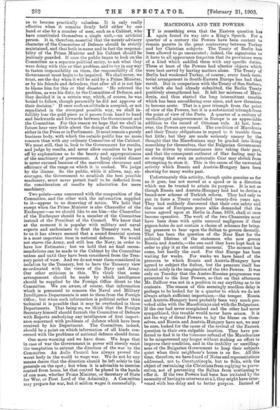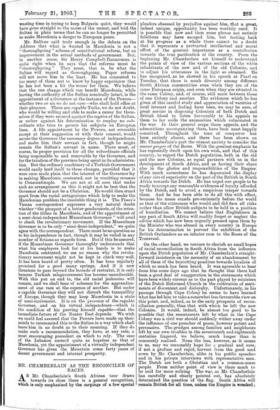MACEDONIA AND THE POWERS.
IT is something even that the Eastern question ha,s again found its way into a King's Speech. For a quarter of a century the Powers have been content to remain passive in the great controversy between Turkey and her Christian subjects. The Treaty of Berlin has been allowed to go unexecuted ; indeed, the signatories to it have to all appearance forgotten that its provisions were of a kind which saddled them with any specific duties. Three at least of the Powers had ulterior objects which were best served by leaving matters alone. The Treaty of Berlin had weakened Turkey, of course ; every fresh terri- torial arrangement in South-Eastern Europe has had that result. But in comparison with the Treaty of San Stefano, to which she had already submitted, the Berlin Treaty positively strengthened her. It left her mistress of Mace- donia, and thus started the long intermittent trouble which has been smouldering ever since, and now threatens to become acute. That is .a poor triumph from the point of view of the Powers, but it is a substantial triumph from the point of view of the Porte. A quarter of a century of unchallenged misgovernment in Europe is an appreciable addition to the record of Ottoman rule. At last, how- ever, the Powers are roused. The condition of Macedonia and their Treaty obligations in regard to it trouble them but little; but they are made seriously uneasy by the thought that the Macedonians may be goaded into doing something for themselves, that the Bulgarian Government may be driven by circumstances into taking their part, and that the consequent outburst of Slav feeling may be so strong that even an autocratic Czar may shrink from attempting to stem it. This is the cause of the unwonted activity which Russia and Austria-Hungary have been showing for many weeks past.
Unfortunately this activity, though quite genuine as far as it goes, has not moved at a speed or in a direction which can be trusted. to attain its purpose. It is not as though Russia and Austria-Hungary had had to devise a brand-new scheme of Turkish reform. They had only to put in force a, Treaty concluded twenty-five years ago. They had suddenly discovered that their own safety and the cause of European peace alike demanded that the terms agreed upon at Berlin in June, 1878, shall at once become operative. The work of the two Chanceries must have been done with quite unusual negligence if their pigeon-holes do not contain a choice of schemes for bring- ing pressure to bear upon the Sultan to govern decently. That has been the question of the Near East for the political lifetime of the statesmen who now govern Russia and Austria,—the one card they have kept back in order to play it at the critical moment. The moment has come, but hardly the card. For that Europe has been waiting for weeks. For weeks we have heard of the pressure to which Russia and Austria-Hungary have agreed to subject the Sultan, but the pressure itself has existed solely in the imagination of the two Powers. It was only on Tuesday that the Austro-Russian programme was presented to the four Powers, so that on that afternoon Mr. Balfour was not in a position to say anything as to its contents. The reason of this seemingly needless delay is perhaps to be looked for in a quarter to which we do not always attach sufficient importance,—the temper. Russia and Austria-Hungary have probably been very much pro- voked alike with the Macedonians and with the Bulgarians. If the one had never complained and the other had never sympathised, this trouble Would never have arisen. It is not the way of Great Powers to lay the blame on them• selves, and Russia and Austria-Hungary have not, we may be sure, looked for the cause of the revival of the Eastern question in their own culpable inaction. They have pre- ferred to find it in the tiresome refusal of the Macedonians to be misgoverned any longer without making an effort to improve their condition, and in the inability or unwilling- ness of the Bulgarian Government to keep their subjects quiet when their neighbour's house is on fire. All this time, therefore, we have heard of Notes and representations addressed, not to Constantinople, but to Sofia, with the object of reeraining the Christians from replying to prone cation, not of preventing the Sultan from continuing to offer it. If the two Powers had been less irritated by the necessity of having to intervene at all, they might have inter- vened with less delay and to better purpose. Instead of wasting time in trying to keep Bulgaria quiet, they would have gone straight to the cause of the unrest, and told the Sultan in plain terms that he can no longer be permitted to make Macedonia a danger to European peace.
Mr. Balfour said truly enough in the debate on the Address that what is wanted in Macedonia is not a " thoroughgoing " scheme of constitutional reform, but an improvement in the actual methods of government. But, in another sense, Sir Henry Campbell-Bannerman is quite right when he says that the reforms must be " thoroughgoing." They must, that is, be what the Sultan will regard as thoroughgoing. Paper reforms will not move him in the least. He has consented to too many of them not to know by happy experience that he has not been a bit the worse for them. We believe that the one change which can benefit Macedonia, while leaving the authority of the Sultan nominally intact, is the appointment of a Governor at the instance of the Powers— whether two or six we do not care—who shall hold office at their pleasure. There are capable Turks, we do not doubt, who would be willing and able to make a career for them- selves if they were secured against the caprice of the Sultan, or rather against his determination to employ no sub- ordinate who tries to govern his subjects on European lines. A life appointment by the Powers, not revocable except at their suggestion or with their consent, would secure the Governor the necessary degree of independence, and make him their servant in fact, though he might remain the Sultan's servant in name. There must, of course, be proper provision for all the subordinate officials being responsible to and removable by the Governor, and for the taxation of the province being spent in its administra- tion. But the ordinary machinery of a Turkish Government would easily lend itself to these changes, provided that it were once made plain that the interest of the Governor lay in making Macedonia contented, not in remitting revenue to Constantinople. We are not at all sure that under such an arrangement as this it might not be best that the Governor should not be a Christian. He would then stand apart from the racial antagonisms which help to make the Macedonian problem the insoluble thing it is. The Times's Vienna correspondent expresses a very natural doubt whether "the prospect of a better gendarmerie, of the reten- tion of the tithes in Macedonia, and of the appointment of a semi-demi-independent Mussulman Governor " will avail to check the revolutionary movement. If the Mussulman Governor is to be only " semi-demi-independent," we quite agree with the correspondent. There must be no question as to his independence in fact, though it may be veiled in any number of fictions as regards form. But if this be assured, if the Mussulman Governor thoroughly understands that what his employers look for at his hands is to make Macedonia contented, we see no reason why the revolu- tionary movement might not be kept in check very well. It has been heard of pretty often. It has been regularly promised for a good many springs, And if it now threatens to pass beyond the bounds of restraint, it is only because Turkish misgovernment has become unendurable.
With this put an end to, the old racial jealousies will remain, and we shall hear of schemes for the aggrandise- ment of one race at the expense of another. But under a capable Governor they will not disturb the tranquillity of Europe, though they may keep Macedonia in a state of semi-excitement. It is on the presence of the capable Governor, and on his virtual independence—which is the condition of his proving himself capable—that the immediate future of the Nearer East depends. We wish we could feel assured that the Powers have made up their minds to recommend this to the Sultan in a way which shall leave him in no doubt as to their meaning. If they do make such a recommendation, they have, at any rate, a most encouraging precedent on which to rely. The case of the Lebanon seemed quite as hopeless as that of Macedonia, yet the appointment of a virtually independent Governor has given the Mountain some forty years of decent government and internal prosperity.











































 Previous page
Previous page